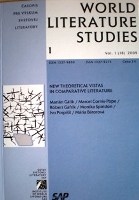Urban Cartographies in the Post-Cold War Era: Postmodern Challenges to Ethnocentric and Globalist Mappings
Urban Cartographies in the Post-Cold War Era: Postmodern Challenges to Ethnocentric and Globalist Mappings
Author(s): Marcel Cornis-PopeSubject(s): Literary Texts
Published by: Ústav svetovej literatúry, Slovenská akadémia vied
Keywords: Mapovanie; Kartografia; Nacionalizmus; Globalizácia; Studená vojna; Multikultúrnosť; Identita; Postmodernizmus; Thomas Pynchon
Summary/Abstract: The post-Cold War period has freed our topographic imagination of traditional ideological polarizations, but has often replaced these imperialistic mappings with cartographies of a nationalistic or ethnocentric kind that promote resentful cultural division. Much of this new ethnic and nationalist fundamentalism has emerged in direct reaction to the pressure of the First World’s ‘globalizing’ ideologies which, far from being ‘deimperialized’, reinforce the ‘international division of labor and appropriation [...] benefiting First World countries at the expense of “Third World” and Second World postcommunist societies’ (Ebert 286). The new tensions between global interdependency and ethnocentric separatism, First-World centers and Third- World peripheries, indicate a state of continued crisis at the level of the ideological frameworks within which cultural exchanges unfold. These frameworks reflect a new ‘heterological’ sensibility, in Michel de Certeau’s sense of the word, without allowing yet a truly liberating ‘discourse on the other’. Neither a globalist ‘notion of multiculturalism [that] affirms difference within a politics of consensus that erases culture as a terrain of struggle’ (Giroux 14), nor a defensive localism which promotes a reified form of ‘specificity’, are proper approaches to the issue of otherness. As Rey Chow remarks in her 1998 book, the ‘gestures of localism and pluralism’ are virtually synonymous insofar as they treat cultural difference in an essentialist and idealized way, as something fixed and final (10). Multiculturalism neutralizes difference by considering all cultural practices valid in their own terms; localism promotes an often chauvinistic notion of ‘our own “cultures”, “ethnicities, and “origins”’ (12). The alternative, proposed by Homi Bhabha, Edward Soja (Thirdspace), Rey Chow, and others, to both the naive celebration of ‘hybridity’ (Chow 155) and ‘nativist centrism’, is the articulation of a ‘third space’ of negotiation (Chow 157) between self and other, native and foreign, global and local.
Journal: World Literature Studies
- Issue Year: I/2009
- Issue No: 1
- Page Range: 14-27
- Page Count: 14
- Language: English

